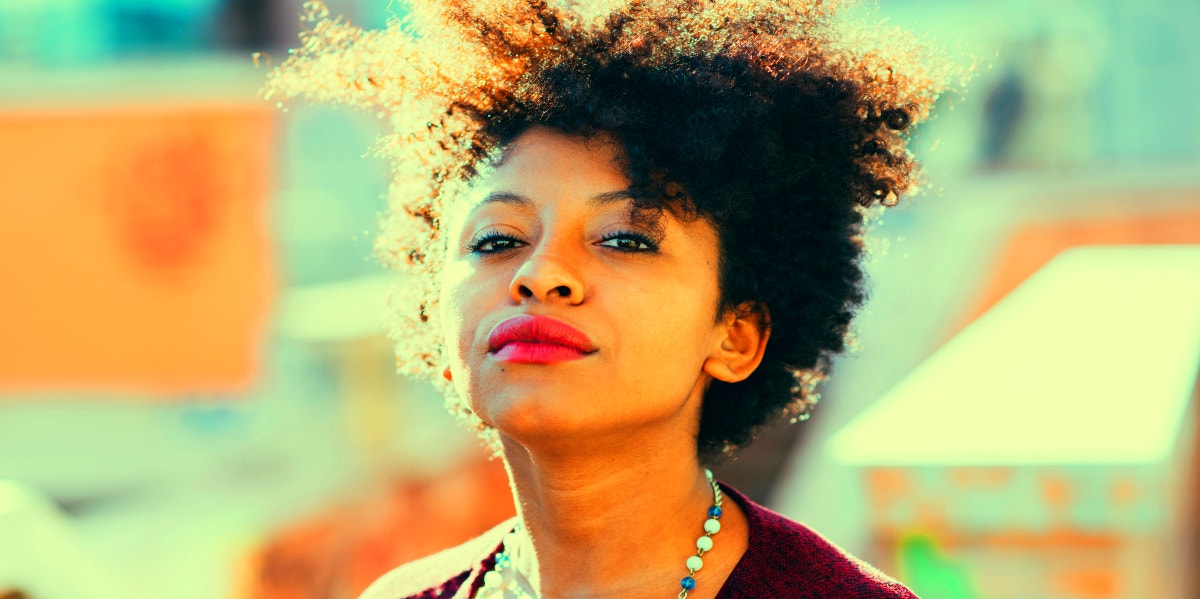Sharing & Consuming Violent Media Is *Not* Allyship
Stop consuming Black trauma.
 Eugenio Marongiu/ shutterstock
Eugenio Marongiu/ shutterstock Eight minutes and 46 seconds is the amount of time police officer Derek Chauvin knelt on George Floyd's neck until he died. We know this from a video taken by an onlooker, which has been reposted and shared across social media platforms and news outlets.
Eight minutes and 46 seconds is the amount of time it took for us to be outraged and horrified by this particular death, but images of Black trauma have existed for a lot longer.
The video joins a host of similar footage from the murders of Ahmaud Arbery, Eric Garner, and Micheal Brown. And just last week, Rayshard Brooks was shot in the back after a minor altercation with police.
Again, it was captured on film.
But these men are just a handful of names we know, and these videos represent a history of violence and trauma inflicted on Black bodies that are reduced to mere hashtags and reposts.
Akilah Hughes, co-host of Crooked Media’s What A Day podcast, responded to the sharing of these types of videos and violent media consumption on a May 27 episode of her podcast.
“Did it make white people evaluate themselves for even half a second? Are there people on earth who are unaware that Black people fear the police because the police disproportionately kill Black people? Do we need videos to prove it? And do the videos even result in justice?” she said.
The prolific sharing of these videos as they emerge exposes a much darker reality about a society that is unwilling to dismantle systemic racism, but will take front row seats to consume Black suffering.
America’s obsession with watching Black trauma is steeped in a history that spans from the earliest days of slavery to modern-day police brutality.
In the 1800s, lynching became a favorite pastime of disturbed white supremacists who would publicly hang murdered Black people for all to see. White families would cheer at the torturing of people of color, while Black communities grieved and remained in constant fear for their lives.
Lynchings were born out of the hatred white people had towards Black people freed from slavery.
In the past month alone, two Black men, Malcolm Harsch and Robert Fuller, were found hanging from trees, their deaths quickly deemed suicide after little investigation.
Last week, trans woman Dominique "Rem'mie" Fells’ dismembered body was pulled from a river in Philidelphia after an attack that mimics the violence of 19th-century racists.
The normalization of violence against Black people has allowed these attacks to persist for centuries, and reposting videos has clearly done little to stop it.
For white people, sharing these images is a performative act of solidarity before they carry on scrolling. For Black people, these are videos of their brothers, sisters, children, ancestors, and descendants pinned under the knees of society.
The intent may be well-meaning, and it is important to continue to raise awareness about racism, but sharing 8 minutes and 46 seconds of footage is futile when we’re not doing the work to stop these attacks before they happen.
The purpose of lynchings was to incite fear into Black people and deter them from rebelling against white supremacy. Sharing, liking, and reposting Black trauma disseminates this same message, even today.
Why do we even need these videos in order to be outraged? Is it not enough to know that a life has been lost? Do we have to hear George Floyd call out for his mother or see that Michael Brown has his hands up?
Yes, these videos are evidence of police malpractice and can be used to incriminate the offending officers, but why is our humanity only proved in the justice given to Black people in death, rather than working toward protecting them when they’re alive?
Arresting a few police officers does nothing to dismantle the corrupt system that made them perpetrators of racist crime. And what about the countless victims who weren’t filmed? Are they not deserving of our sympathy?
These videos become something we scroll past and ignore, or can watch over and over until we’re completely desensitized to the lives ending before our eyes.
When it comes to white victims in murders or mass shootings, they are protected and given dignity. we don’t need to watch them die in an Instagram video in order to grieve or honor their memory.
White supremacist society has fostered an obsession with Black trauma, but has done nothing to channel that obsession into tangible change.
Each repost is a missed opportunity to share anti-racist resources or information.
Each 8 minutes 46 seconds spent watching violent media is time that could have been spent educating yourself or appealing for police funds to be redirected.
I'm reminded of something else Hughes said: “The voyeuristic nature of sharing Black human beings murdered like it’s just a normal thing on a Tuesday didn’t bring that guy back. It didn’t stop racism.”
Alice Kelly is a writer with a passion for lifestyle, entertainment, and trending topics.
